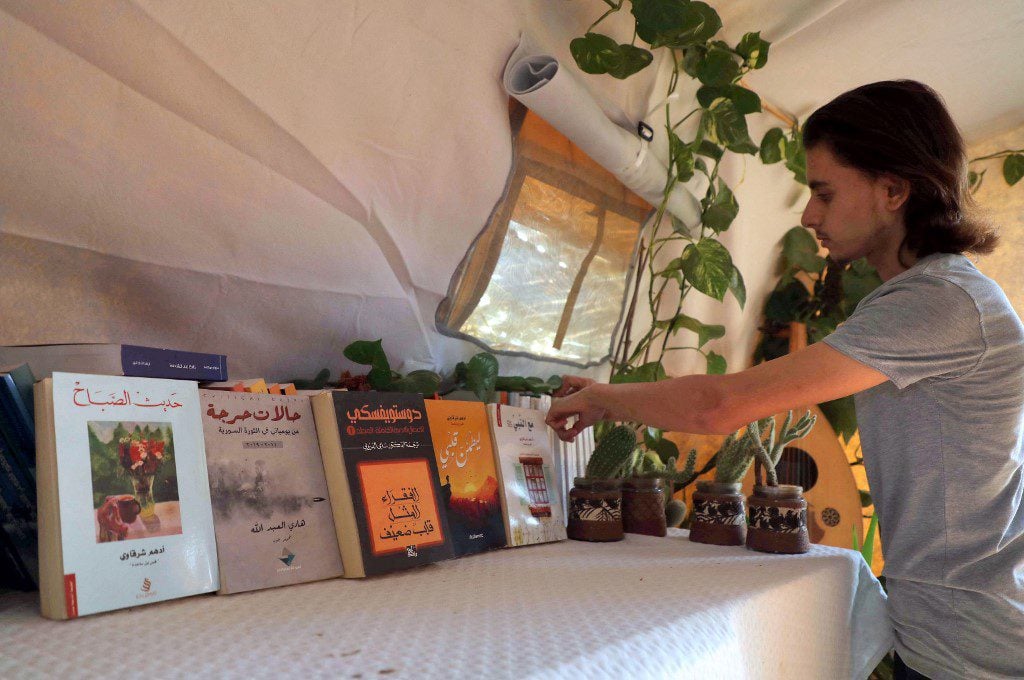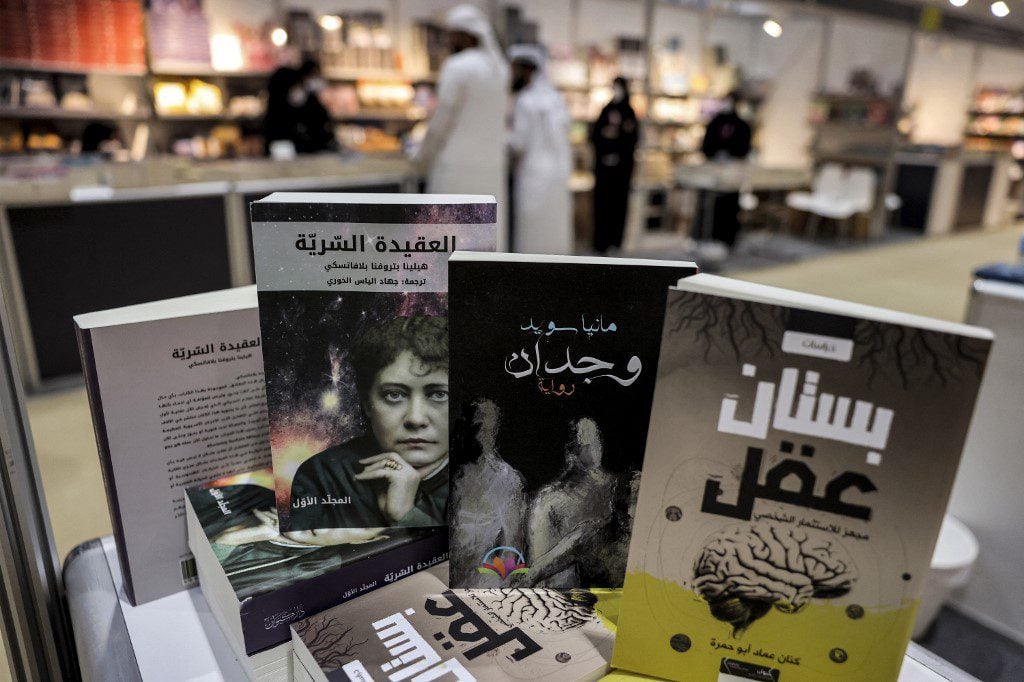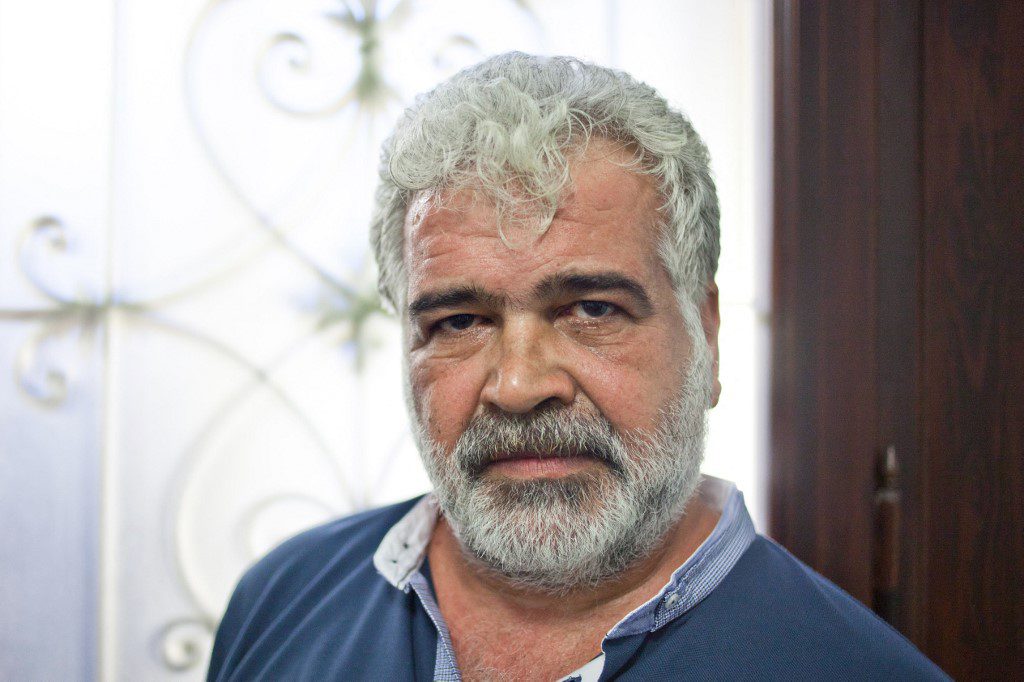The refugee waves that followed the Arab Spring gave rise to a new type of Mahjar literature, namely “refugee literature.”

Hussein Ali al-Zoubi
The refugee waves that followed the Arab Spring gave rise to a new type of Mahjar literature, namely “refugee literature.” That kind of literature comprises literary works written by Arab writers that reside in countries of refuge.
The term can be found in numerous studies, such as Literature of Syrian Refugees, conducted by the Harmoon Center for Contemporary Studies. Arab literature has gone through many categorisations, such as Mahjar, exile, prison and feminist.
However, the emergence of refugee literature sparked controversy in Arab intellectual circles, particularly in Syria, since many deem the definition “ambiguous and loose.”
A Different Literature
Iman Meslmani, the Syrian writer and novelist, believes it is too early to put labels on literary works from countries of refuge. He indicates that the style is in its formative stage, and time will find a proper term for it, whether it is a new kind of Mahjar or refugee literature.
Meslmani says, “There are no similarities between the old Mahjar literature, by Levantine writers who migrated to the Americas, that thrived in the early 20th century and the literary works that followed the Arab Spring. Most Mahjar literature incorporated a longing for the homeland. However, criticism of the injustice befalling the citizens of these countries is a central theme in the current literary products.”
Writer and publisher Hussein al-Daher believes the features of the current literary era have not yet sufficiently taken shape to coin a proper term for it. He, too, suggests they might not crystalise anytime soon.
Referring to the differences between Mahjar and post-Arab Spring writers, al-Daher says, “Most of the writers who founded Mahjar literature left their countries of origin voluntarily, contrary to those who were forced to migrate following the Arab Spring. Arab Spring writers, if the term serves properly, produced pieces featuring revolting tendencies that are shocking at times and melancholic at other times. It is because reality is imprinted in their writings. The Mahjar literature works differed, as they featured a longing for the homeland, singing and reminiscing about it.”
Mahjar literature refers to the works of Arab poets who lived in the countries they migrated to. When World War I started, their contributions manifested in the Mahjar literary school, which left a significant mark on Arabic literature.
Well-known Mahjar writers include Gibran Khalil Gibran, Mikhail Naimy and Elia Abu Madi. The literary works of these writers spread among the diaspora and at home. Arab intellectuals came to read these literary works that featured a sweet style and beautiful wording.
A Bet on Literary Criticism
Al-Daher believes literary criticism would help create a clear image of the transitional stage. He added, “Technological revolution, wars and disasters blew away the cobweb. Additionally, the absence of institutions organising and guiding literature in countries that experienced revolutions caused a literary whirlwind that filtered literary works, and only a few will survive. These surviving works will later determine the features of the current literary stage.”
From this perspective, Syrian writer and critic Ola al-Jabr, stresses the urgency of conceptualising the critical works of a decisive period in the post-Arab Spring literary history. She says, “This historic shock will be the primary determinant of change in the world of literature. Indeed, literature before and after the Arab Spring are vastly different.”
Margin of Freedom

In recent years, the Arab political sphere underwent revolutions and coups, followed by changes to the produced literature as a result of these political shocks. The shifts highlighted a significant intersection between political and cultural literary products, not to mention the social product connected with people’s daily life.
These changes formed the initial features of what might be a school of realism that attempts to depict reality without delving into ideals.
In this context, in his book, Literary and Critical Schools, Shokri Ayyad says literary realism is concerned with ordinary people, whether they are good or bad.
According to Ayyad, this school refers to people’s morals and customs, what they went through, what they did and what was done to them. Also, it frankly depicts their reality with all its different situations. It, thus, seeks to unravel human nature.
It seems that realism imposes a particular pattern of narration. In this regard, al-Daher says, “Writers now tend to the simplicity of western literature in general and European literature in particular. On this basis, many Syrian writers abandoned using complex vocabulary and symbolism in exchange for a simple yet deep text. Consequently, such simplicity means the writers’ thoughts are delivered properly when their work is translated into other languages.”
There was a notable attempt to document what was happening in the novels that followed the Arab Spring. Since a single novel cannot assume such a role, some literary works have attempted to simulate reality in a specific geographical area.
The novel Death is Hard Work by Syrian writer Khaled Khalifa is a case in point. Khalifa said, “We have become a problem for ourselves. We cannot think beyond what happened and will continue writing about it for at least another 200 years.”
The novel takes place on the road between Damascus and Aleppo. Bolbol has to execute the will of his father, Abd al-Latif, who died in Damascus, and bury his body at the family cemetery north of Aleppo. To do so, Bolbol accompanies his brother Hussein, who owns a minibus, and their sister Fatima.
Due to the multitude of procedures and checkpoints, the mission grows into an extended journey that lasts four days and nights. During the journey, their father’s body is seized, and the sons are stopped several times at checkpoints of the regime and other parties. The journey’s length causes the corpse, placed on the bus without a coffin, to start rotting and decomposing.
The story ends with the painful scene of ferocious wild dogs, attracted to the smell, attacking the bus while the sons stopped at a crossroads one night.
Throughout the journey, the writer presents the past of Abd al-Latif’s family and the relationships between its members. Khalifa does so through heated conversations between Bolbol and Hussein and flashbacks in the narrative to the family’s past, through which he reflects on the connection between the homeland and the revolution. The writer also depicts how some of the family’s values transform as they move from the countryside to the city.
A Scope of Freedom and the Relation with the Refugee Society

Khaled Khalifa was able to travel back and forth to Syria. That same luxury, however, did not befall many young writers. These writers found vast space in their countries of refuge to document their life experiences. Many novels have covered the plight of detention and sea crossings in search of asylum.
For instance, the novel Returning to Aleppo by writer Abdullah Maksour. Through his novel, Maksour narrates his bitter experience with detention and describes the horrible torture he endured in prison.
Perhaps the most famous example is the novel The Shell: Memoirs of a Hidden Observer by Mostafa Khalifa. The book recounts the diaries of a young man who, as he returned from France, was arrested upon arrival at his country’s airport. The young man, who travelled to France to study film directing, spent 12 years in prison, unknowing of the charges against him.
Even though the man is Christian, the bogus charge ultimately turns out to be an association with the Muslim Brotherhood. In his novel, Khalifa focuses on the protagonist’s experiences rather than his actions, trying to depict him not as a hero but as an ordinary person observing the events surrounding him.
Hussein al-Daher considers the fact that young writers found space to document their experiences a privilege created by the Arab Spring revolutions, which has broken various taboos.
He says, “These revolutions freed some writers to address what could not be addressed before. They served as a catalyst for many writers to unleash their creativity that was shackled by many factors, perhaps the most restrictive of which was the dictatorial regimes’ tight security grip.” Suppose al-Daher’s opinion hits the mark in some aspects; asylum countries have provided the space for democracy. We probably would not be reading novels of the realism school were it not for this.
Regarding the relationship between literary works and the societies of host countries, Meslmani believes the impact of the literary works was exclusive to the external environment due to the superficiality of the authors’ integration within these societies. The writers did not profoundly impact the literary culture of host communities.
She says, “The influence of these societies on writers remains limited and depends on familiarity with these countries’ languages and cultures. However, this influence might grow over time.”
Poet Mohamed al-Matroud says that cultural activists tried to convey the suffering of those who remained in Syria during the first years of the Syrian crisis. He believes they gradually integrated with their new countries’ structures, which might deepen their literary works to address the issues refugees face in host societies.
It is worth referring to the novel Dawwar by Syrian-Palestinian writer Ahmed Azzam. The novel starts when Tayseer reaches Turkey and suddenly finds himself deep in a new life he thought would be radically different from what he had suffered in Syria. He discovers that he cannot distinguish between his current suffering as a refugee and his previous suffering in Syrian prisons.
Difficulties Imposed by Reality
Before the Arab Spring, Arab writers in general, and Syrian writers in particular, were deprived of freedom and suffered from political and cultural censoring. Obsolete social notions dominated the government’s cultural mindset.
Moreover, the state and authorities controlled culture and literature through ministries of culture. On the other hand, new novels did not approach social and religious taboos.
Despite the limited space of freedom that exists, this type of literary work continues to be a danger zone that writers are generally wary of, perhaps because dismantling political taboos remains a priority as their causes remain.
Technically and commercially, the literary boom has created new challenges and complexities for writers. In this regard, Hussein al-Daher says, “Most publishing houses reconcile both the commercial and cultural paths. They are not as keen on publishing high-quality literary work as in the past, except for writers with a wide audience.”
He adds, “Finding a publisher to print a book, distribute it and share profits has become impossible. Currently, most publishing houses must be self-reliant to carry on without institutions that support publishing. It caused several major publishing houses to close.”
As for Meslmani, she says, “The absence of Arab readers in the European countries of refuge has created difficulties in promoting literary works there. In turn, most publishing houses are reluctant to adopt literary work, especially since they focus mostly on a group of known writers, who secure quick profits for publishers.”


